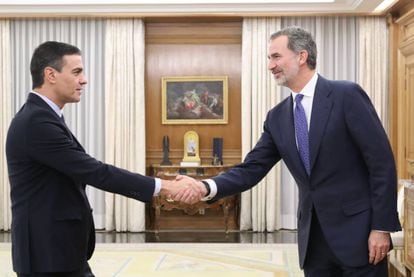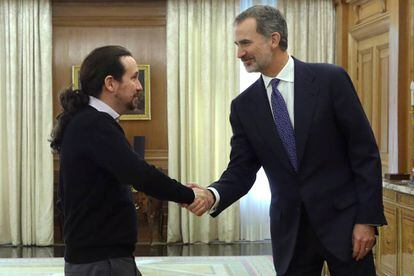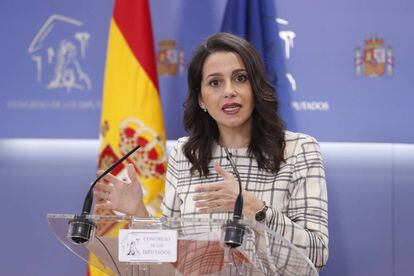Spain’s King Felipe calls on Pedro Sánchez to form a new government
After a round of meetings with political leaders, the monarch has proposed the Socialist Party chief as the candidate with the best chance of being sworn in as prime minister

Spain’s King Felipe VI on Wednesday nominated Pedro Sánchez of the Socialist Party (PSOE) as the candidate with the best chance of being sworn in as prime minister by Congress.
The monarch reached this conclusion after finishing a first round of talks with political leaders to determine whether there is a viable candidate to form a government in the wake of the repeat general election of November 10.
The PSOE hopes that there is not a third election. Spain needs a period of stability
Caretaker PM Pedro Sánchez
The caretaker prime minister accepted the nomination, and announced that he will meet on Monday with the leader of the conservative Popular Party (PP), Pablo Casado, and the spokesperson for the center-right Ciudadanos (Citizens), in an effort to secure enough support for an investiture vote.
PSOE spokesperson Adriana Lastra will meet with all the other political parties in Congress, including the far-right Vox, and Basque nationalist party EH Bildu. Both groups have until now been excluded from the negotiations.
“It is a task I assume with honor and gratitude,” Sánchez told the press on Wednesday, after being nominated by the king. “It will be a complex but exciting task. [...] The PSOE hopes that there is not a third election. Spain needs a period of stability.”
Sánchez said he will also meet with all regional leaders, including Catalan premier Quim Torra.

While Sánchez won the election with 120 seats in the 350-strong Congress of Deputies, he has been struggling to secure enough backing from other parties to ensure his confirmation in office.
Sánchez needs 176 votes for an absolute majority to be sworn in on the first round of an investiture vote, or a simple majority – more yes votes than no – to be confirmed in the second round of voting.
Although the PSOE leader has reached a deal for a governing coalition with the anti-austerity left-wing Unidas Podemos, which won 37 seats at the November poll, he still does not have enough support to be confirmed in either instance. A date for an investiture vote has not yet been set. If Sánchez submits to the vote and fails, Spain could be facing yet another repeat election next year – the fifth in less than five years.
“We want an investiture as soon as possible, but it does not depend on us,” said Sánchez on Wednesday.
His party is currently in talks with the separatist Catalan Republican Left (ERC) in a bid to secure an abstention from its 13 lawmakers in the lower house at an investiture vote, which would allow Sánchez to be confirmed in the second vote.
The king’s meetings
On Wednesday, the Spanish monarch met with Pablo Iglesias of Unidas Podemos, Santiago Abascal of the far-right party Vox, Casado of the PP and with Sánchez last of all.
Following his meeting with the monarch, Iglesias alluded to the Catalan issue. “It would be good for Spain if the investiture took place before the end of the year. Both the PSOE and ERC are doing a lot to reach an agreement. But we need to respect the time frames and remain prudent,” said the Podemos chief.
Earlier in the day King Felipe received a representative from another separatist party, Together for Catalonia (JxCat), which has eight lawmakers in Spain’s lower house. Afterwards, Laura Borrás confirmed that her party has no plans to support the caretaker prime minister. “Our position has not moved an inch,” she said.

On Wednesday, the leftist Catalan coalition En Comú Podem urged ERC and JxCat to abstain and let Sánchez form a governing coalition with Unidas Podemos. “An abstention is not an endorsement, it is neutral, an option for someone with no better alternative,” said alliance leader Jaume Asens after meeting with Felipe VI.
Meanwhile Inés Arrimadas, of Ciudadanos, is proposing an alternative agreement that would eliminate the need to rely on Catalan separatist parties.
Arrimadas is proposing “a grand constitutionalist agreement of 221 seats” and said she would telephone Sánchez on Wednesday to offer him this possibility, which also requires collaboration from the PP. Her party’s former leader, Albert Rivera, stepped down after suffering a stinging defeat on November 10, suggesting that many voters were unhappy about Ciudadanos’ recent shift to the right.
English version by Melissa Kitson and Susana Urra.












































